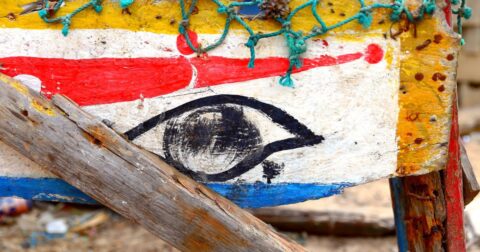Feature
Stretched Thin, Iowa Agency Issues Few Fines for Manure Pollution
Climate•9 min read
Reported
From dwindling fish to decimated communities in the Global South, nothing about the growing demand for seafood is sustainable.


Words by Grace Hussain
The global seafood industry has doubled in the past 50 years, creating a boom for the fishing industry as producers race to satisfy U.S. and European markets. The rapid growth of the industry has had plenty of impacts — dwindling fish populations and damage to marine ecosystems among them. But new research is shining a light on another consequence — massive changes to coastal communities in the Global South. A study of five Senegalese fishermen reveals how demand for cheap, massively produced fish has driven migration to Spain in hopes of a brighter future, one that has yet to materialize.
Beginning in the 1970s, European fishing operations set their sites on the west African coast. European Union leaders ultimately entered into an agreement with a number of west African countries, including The Gambia and Mauritania. In exchange for the right to collect massive amounts of fish, Europe paid just a few million euros, a fraction of what the fish would be sold for at market back home.
“The fish costs them €5 for the lot and they sell it for €200,” Abdou, a Senegalese fisherman who was driven to immigrate to Spain by industrial fishing interests, said in an interview about the large processing factories popping up in his home country. Abdou is one of thousands who moved to Spain from West Africa.
European fishing companies have depleted a once plentiful marine ecosystem. By the late 1990s, the annual catch had surpassed sustainable levels by 30,000 tons. But even as fisheries there struggled, the appetite for fish in the global north continued to grow.
The “fish that you see here in the restaurants…it’s from Africa”, commented Moussa, a Senegalese fisherman who emigrated to Spain where he spent some time working in Spanish eateries. “In Barcelona, in Madrid, it’s all from Africa!”
Part of the heavy toll has been driven by extensive illegal fishing. Because many West African nations lack a navy, it’s easy for undocumented and unregulated fishing vessels to slip from one country’s waters into another’s unchecked. These vessels are responsible for 40 percent of the fish caught in the region.
Fishermen point to the dwindling fish populations as the reason for their move, as more fish went to the factories popping up in Senegal to sell and process fish for factory farms in Europe. “That’s why I sold my [boat] and came [to Spain] to have a better life,” said Souleymane.
The factories grind the fish down into meal and fish oil and export them to other countries for use in industrial operations. Most fish meal (69 percent) and fish oil (75 percent) goes to supplementing salmon feed and other types of farmed fish. In other words, industrialized fishing begets the need for more industrialized fishing.
In a 2022 study, United Nations researchers found that rerouting fish to meal and oil factories will likely lead to significant increases in food insecurity in Sub-Saharan Africa. Despite diminishing supply, according to FAO estimates, the aquaculture industry is set to increase 14 percent by 2030.
One problem stems not only from the fact that too many fish are being caught, but from the methods used to catch them. “The trawlers are bad,” Ousmane, a Senegalese fisherman now living in Spain said in his interview. “If a trawler passes by, that’s it. There won’t be any fish there for years.”
The trawling Ousmane refers to consists of dragging a large net along the seafloor. Scientific evidence on the ecological impact of trawling reaches the same conclusion as Ousmane: ecosystems often take years to recover from bottom trawling.
Trawling destroys the sensitive root systems of marine plants and demolishes animal dens. The practice also shifts water conditions as sediment is resuspended, preventing light from penetrating much further than the surface, making it more difficult for plants to grow back.
Coral, which often grows very slowly over many years, frequently falls victim to bottom trawling. In fact, one estimate suggests that 40 tons of coral in the North Pacific Ocean are caught in industrial fishing equipment every year. Coral and many other animals unintentionally caught by trawling are often thrown overboard.
Two of the five study participants knew family or friends who had been killed by trawlers. Both were run over at night in their fishing boats by these larger ships, and the nets they drag. Their only defense: gasoline-filled barrels which they set alight and send out into the water in an effort to alert the ship to their presence.
When West African fishermen emigrate away from their communities, their situation rarely improves. Many come to Europe as undocumented workers, hoping to one day receive papers to allow them to stay. But without papers, the workers are unable to access the social support systems that benefit low-income Europeans. And “whether or not immigrants finally become legalized is often determined by the whims of the market,” the researchers found.
In Spain, agriculture is one of the largest employers of immigrant labor. All five of the participants interviewed began working in the industry once they arrived. But because agricultural work is often seasonal, the industry does not provide the proof of steady, full-time employment necessary to secure legalization.
Nor has the move given the former fishermen a fair wage. Immigrant workers are often paid less than half of what a local worker in the same job makes. Still, the wave of migration continues, as workers send money back to their families in Senegal. As of 2017, 10.2 percent of Senegal’s GDP came from workers abroad. Workers continue to send money back home, and industrial fishing operations there continue the destructive work of extraction.